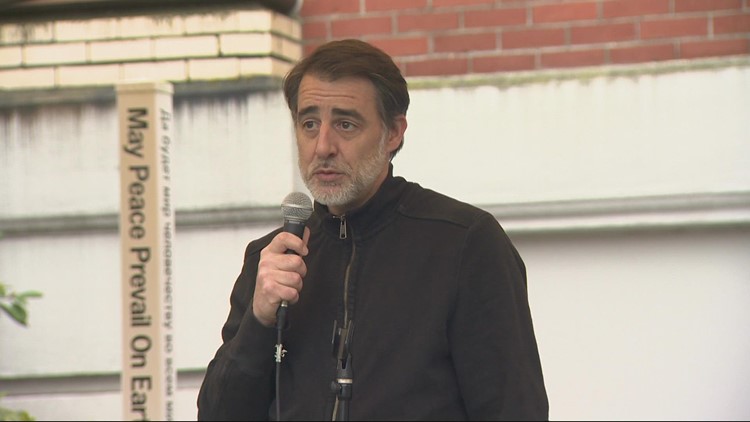NEWBERG, Ore. — When the Newberg School District Board of Directors voted 4-3 to fire former Superintendent Joe Morelock without cause on Nov. 9, multiple dissenting board members criticized the decision as rushed and said they had not been given adequate time to read through the motion.
Emails obtained by KGW through a public records request appear to back up an assertion from the three dissenting board members that they were not given copies of a packet listing possible draft resolutions to fire Morelock until two hours before the meeting, during an executive session.
Here’s how events played out leading up to – and during – the meeting:
Political display controversy
The meeting agenda for Nov. 9 was posted online on Nov. 5 and made no mention of firing Morelock, but it did include a public hearing for the board to decide whether to uphold or overturn a previous decision by Morelock about a complaint related to the district’s controversial political sign policy.
The board adopted a policy on Aug. 11 banning employees from displaying LGBTQ+ and Black Lives Matter signs on campuses. The American Civil Liberties Union threatened to sue, and Morelock told the board on Sept. 1 that he would not uphold the ban because district lawyers had advised him that it was unconstitutional. On Sept. 28 the board voted to adopt an amended policy to ban all political displays.
According to emails included in the Nov. 9 meeting packet, Dundee resident Michael Gunn emailed Dundee Elementary School Principal Reed Langdon on Sept. 30 to report what he described as a gay pride sign in the window of a classroom in violation of the policy. The sign consisted of the phrase “Be Known” in front of a heart shape with a rainbow background.
Langdon replied on Oct. 14 that he had examined the sign and concluded it was not political. Gunn appealed the decision to Morelock, who replied on Oct. 29 that he had also concluded it was not political, citing the fact that “Be Known” is the tagline of George Fox University. Gunn then appealed Morelock’s decision to the school board.
Before the meeting
According to emails supplied to KGW in response to a public records request, board secretary Jennifer Nelson emailed board members on Nov. 8 to notify them that the agenda for a planned 5 p.m. executive session ahead of the 7 p.m. meeting the next day had been updated to include an item under the category “Employee Dismissal or Disciplinary Matter – Complaint Received by School Board.”
Later that day, board Chair David Brown emailed each of the other six board members and stated that the executive session would cover three items: “Gail Grobey American Flag being taken down,” “Dundee teacher lawsuit concerning Mike Gunn complaint” and “SuperIntendent complaints.”
At about noon on Nov. 9, attorney Tyler Smith sent an email to Brown stating that he had attached an updated packet “on the process for consideration of Complaints relating to the Superintendent for tonight’s meeting(s),” and that a copy should be sent to each board member with a note to keep the contents confidential because they were attorney-client privileged and pertained to an executive session. The attachment was not included in the public records release.
Brown replied to Smith at 3:23 p.m., copying the other board members and Nelson, and said “Please see that this packet is for school board members only and not to be shared in any way. Tonight during executive session will be discussing SuperIntendent complaints.”
Nelson and board member Ines Peña both replied in the following hour and stated that there was no packet attached to the email. No further emails were released in response to the records request.
At the meeting
Shortly after the start of the 7 p.m. meeting, Brown sought to add a discussion about the superintendent to the agenda, describing the topic as something the board had just talked about in the executive session. Board members Brian Shannon, Trevor DeHart and Renee Powell voted with Brown to add it, with Peña and board members Rebecca Piros and Brandy Penner voting no.
During the public hearing regarding Gunn’s complaint, the board members discussed whether the sign in question violated the policy and Piros tried to call for a vote to uphold Morelock’s decision, but Shannon introduced a superseding motion to table the issue without reaching a decision, and Brown, DeHart and Powell voted with him.
Towards the end of the meeting, Brown made a motion to terminate Morelock without cause. Smith interjected and recommended that Brown use one of what he described as multiple possible motions included in an executive session packet, because the language of those options had been given legal review by Smith.
Penner, Piros and Peña all indicated that the packet in question was the one that Brown had apparently failed to attach to the emails sent earlier in the day, and that none of them had seen the packet until the executive session.
Shannon replied that he had not seen the packet until the session either and said the delay was due to “a mix-up in forwarding it on to us, apparently, not because anyone conspired to keep it from us.”
Penner, Piros and Peña all argued that regardless of the reason for the delay, the board should wait to take action until all of the members had been given sufficient time to review the packet.
After consulting with Smith, Brown stated that his motion would be to give Morelock 10 days’ notice of termination with no cause, apparently reading from language included in the executive session packet. Brown, Shannon, DeHart and Powell all voted to adopt the resolution.



